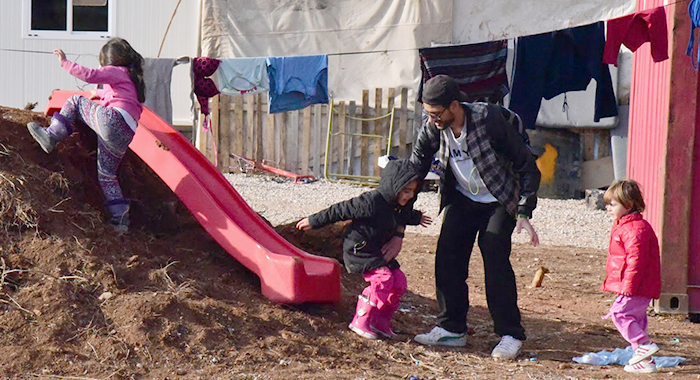Gap Program Leader Returns to Syrian Refugee Camps
The mission of the St. Norbert College Gap Experience, a semester-long, service-learning program for incoming first-year students, includes a call to “confront complex social-justice issues and engage in real-world solutions to these problems.”
Gap Experience students can look to Diana Delbecchi, assistant director of the program, as an example. Delbecchi continues to support Syrian refugees as they seek asylum in European countries. In May, she traveled to the Netherlands and Sweden to visit refugees she befriended while serving at a camp in Ritsona, Greece.
“In the Netherlands I saw one of the young boys who was unaccompanied,” she explains. “He was only recently resettled in August. He was reunited with his mom, dad and younger sister, who is 16. They had been living in Damascus and had sent him (out of the country). They feared for his life.” Many Syrian parents sent their sons to refugee camps in Greece and Italy to flee the conflict in their homeland. Young men in Syria may be conscripted into the army to fight for the Assad regime or for rebel groups, says Delbecchi. If they stay, they may die in conflict.
During her recent travels, Delbecchi also met with a young Syrian man in Stockholm, Sweden. He too was resettled form the refugee camp in Greece. Unlike the young man in the Netherlands, his family will not be reunited.
“His parents don’t want to leave,” says Delbecchi. “His grandparents are old, so they want to stay. It’s still sad. They got here; they are resettled and the reality sets in. ‘This is now my life.’ He is alone. I visited [Syrian refugee] boys in Finland last year and they all say that they miss Greece. There was no life for them in Greece, but a community formed there where everyone speaks the same language.”
A turn in the road
Delbecchi never envisioned that she would be working on the ground at a refugee camp. Following graduation from the University of Wisconsin-Green Bay, she worked in higher education for five years before earning a master’s degree in gender, globalization and human rights from the National University of Ireland.
“I specifically made a point to study undocumented student populations in the U.S. and their right to access education,” she explains. “My intention was never to go to the ground. I had been trying to find a way to utilize my skill set and my research. An organization [I Am You], a small Swedish-based NGO [non-governmental] needed someone on the ground to do research.”
In the fall of 2016, Delbecchi committed for a month to research educational opportunities for refugees, ages 15 to 25, at the camp in Ritsona. She interviewed a large number of refugees and presented her findings. Delbecchi was then asked to implement programs based on her research.
“English classes for the youth population were started,” she says. “Part of my research was identifying that anyone 15 or older did not have access to formalized education.”
In Greece, people 15 or older are not required to go to school.
“The argument from the NGO is these individuals [Syrian refugees] have been out of school for a number of years due to the conflict,” says Delbecchi. “Aren’t we required to give them an education? We put together an education curriculum and programming specifically for the youth.”
Delbecchi ended up staying in Greece for four months. Before she left, I Am You partnered with Lighthouse Relief, an organization with more funding, to continue the programs.
“These young men are the most vulnerable, in my opinion, of being radicalized,” says Delbecchi. “We did see ISIS militants in Greece trying to recruit. Our big effort was to try to keep them occupied and engaged, so they didn’t feel so detached and angry about the waiting period” (an average of 18 months for asylum).
Prior to starting her position at St. Norbert, Delbecchi returned to Ritsona to support preschool education at the camp. All pre-schools are private in Greece. She helped formalize curriculum for a 2- and 3-year-old and a 4- and 5-year-old program.“These kids are hungry to learn,” she says. “They need structure. To have this normalcy is so important. The parents have really appreciated it.”
The campus gets involved
Delbecchi’s support of Syrian refugees in Greece has extended to include collaboration with the college. She was approached by Bob Pyne (Community Engagement), and Marc Schaffer, assistant professor of economics and director of the St. Norbert College Center for Business & Economic Analysis (CBEA), about an education project to provide food to the camp. Four St. Norbert students are working on the project, which involves the Farmory, a nonprofit that produces sustainable, indoor agriculture.
“The food shortages are many in Greece,” says Delbecchi. “If the Farmory can take that model of hydroponics and aquaponics and somehow put that into some sort of shipping container model it can help with the shortages. We are partnering with an organization on the ground called Café Ritz. Anything in Greece takes time, but we see it as an interesting project as part of a big vision.”
July 3, 2018












